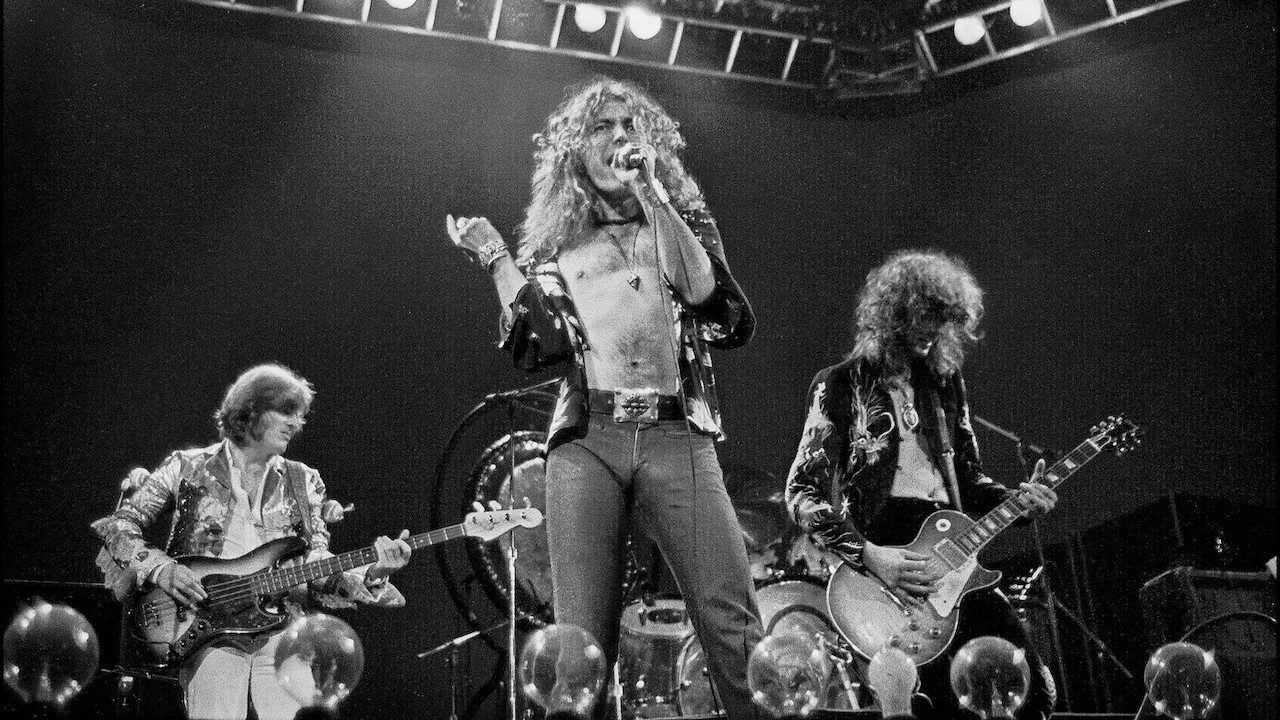
Few non-bassists hear the name Led Zeppelin and immediately think of John Paul Jones. But with his seemingly bottomless skill set, Jones was the ultimate addition to what is argued to be the most influential rock band of all time.
Armed with years of experience as a session bassist and arranger – having worked with the Yardbirds, Dusty Springfield, the Rolling Stones, and Jeff Beck – Jones brought an ear for experimentation, folding keyboards, mandolin, and much more into Led Zep’s potent brew of blues, folk, rockabilly, and hard rock.
“When we first met it was just to see if we could even stand each other,” Jones told BP. “Robert had heard I was a session man, and he was wondering what was going to turn up – some old bloke with a pipe? Concentration is what made it successful – anybody could take anything anywhere, and we’d all follow.”

Gibson, Fender, Manson and Alembic bass guitars have all fallen into the hands of John Paul Jones at some point. He was also one of the first bassists to experiment with an 8-string bass. “I had to fill out a wide frequency range – just low bass with drums wouldn’t do the trick, but an 8-string covers the bass and the midrange very well. When Jimmy Page first saw my 8-string rig, he said, ‘I’m not playing to that!’ But of course he did. It covered most of the stage and the parking lot; it wasn’t a subtle instrument.”
On the subjects of rhythm-section magnetism, and general rock ’n’ roll entropy, Jones is an undisputed expert. Here’s a look at some of his finest work.
1. Good Times Bad Times (Led Zeppelin, 1969)
With all the majesty of the greatest riffs in rock, Good Times Bad Times is the perfect introduction to Led Zeppelin’s singular bass man. Jimmy Page explained how it came together in his 2012 Rolling Stone interview: “John Paul Jones came up with the riff. I had the chorus. John Bonham applied the bass-drum pattern. It was like, ‘Wow, everybody's erupting at once.’” After the rocking root-5-root movement in the second bar of the main bass riff, Jones cuts loose with some killer fills into the song's breakdown sections.
2. Ramble On (Led Zeppelin II, 1969)
Heavier, groovier, and more melodic than their debut, Led Zeppelin II replaced The Beatles at the top of the album chart in Feb 1970. For much of the album, Jones doubles Page’s guitar riffs, helping the songs achieve the potency a generation of headbangers came to love. But that wasn’t all, as the expertly nimble bass playing on Ramble On showed. “You’ve got to have the big picture in mind when you’re playing,” Jones told BP. “It’s not about playing whatever the lowest note available is. You have to consider melody, rhythm and harmony.”
3. Since I’ve Been Loving You (Led Zeppelin III, 1970)
Exhausted by 18 months of touring, Page and Plant holidayed at Born Y Air cottage in Wales, resulting in half of Led Zeppelin III being acoustic-based. Enter Jones as Mr Multi-instrumentalist: Mandolin? Upright bass? No problem. The album also featured Zeppelin’s best blues to-date, Since I’ve Been Loving You, impossible to imagine without Jones’s keyboard part.
“Everyone was saying, ‘Oh, they’ve gone acoustic now’ Well, no, actually! We were just listening to a lot of Fairport Convention and Joni Mitchell. And that’s what you do – you assimilate what you like from what you hear and you reinterpret it. So yes, I hear licks now that I probably wouldn’t have done before.”
4. Black Dog (Led Zeppelin IV, 1971)
It was Jones, not Page, who wrote the main riff of Black Dog, though the band had to simplify it before they had the storming result. “I wrote that riff on the back of a train ticket coming back from a rehearsal at Jimmy Page’s house. We had to smooth it out in order to make it comprehensible. When I first played it for Bonzo, the look on his face was a picture!”
As this point in his career, Jones was predominantly playing fingerstyle, but he was equally adept at using a pick. “My preference is always to play fingerstyle, but I often had to play with a pick in the session days, so I got quite used to it. I can play Black Dog with my fingers, but it just sounded better with a pick.”
5. No Quarter (Houses of the Holy, 1973)
Though he played a mean bass guitar, John Paul Jones was every bit the bassist on his Moog Taurus keyboard bass pedals. Written for 1973’s Houses of the Holy, No Quarter was a majestic bit of mood music anchored by Jones’ spooky keyboard hook. With low pedal tones in the verses, the bass figure steps up in the buildup to the tune’s heavy pentatonic riff. “I had bass pedals littered all over the stage. I’d be there with a triple-neck guitar, bass pedals, and keyboards, and Robert Plant would ask, ‘Can you sing, as well?’”
6. Kashmir (Physical Graffiti, 1975)
Fed up with touring, Jones nearly quit Led Zep in the late summer of 1973. After a rest, he was persuaded back for the group’s most ambitious record, Physical Graffiti. Kashmir shows Jones playing an essential role in giving Zep a new mid-period symphonic sound, the perfect backdrop to Bonham’s battering and Page’s riffola. “At first it was just Bonzo and myself,” Page told Louder. “He started the drums, and I did the riff and the overdubs.” The eight-and-a-half minute epic was completed with Jones sketching out what would later become the orchestral parts with his Mellotron.
7. Achilles Last Stand (Presence, 1976)
Recorded in difficult circumstances after Robert Plant’s serious car accident in August 1975, the group’s seventh studio album, Presence, showed by default just how important Jones had become to the brilliance of a Led Zeppelin LP. Achilles Last Stand harnessed the amazing power of the Bonham/Jones rhythm section, as they plough their way through nearly 10 minutes of furious rock and cannoning 5/4 breaks. “The timing was interesting in Achilles because of the 5/4 bits. When Page came out with the first riff he said, ‘What are we going to do with the rest of it?’ I said, ‘The 8-string bass!’ It fitted perfectly.”
8. Dazed and Confused (The Song Remains The Same, 1976)
Filmed during a three-night stint at Madison Square Garden in 1973, The Song Remains the Same was released during an enforced layoff due to Plant’s injuries. The film shows Jones nonchalantly coping with every kind of musical mayhem Page and Plant could create out front. His experience as an arranger is immediately apparent on the spaced-out melodrama of Dazed and Confused, which features more epic rhythm section interplay. “I really wanted the drums and the bass to be one unit – that’s what drove the band along. It’s not two instruments playing separately, it’s one rhythm section.”
9. All My Love (In Through The Out Door, 1979)
By 1979 Led Zeppelin were heading in a new direction as they tried to surmount personal tragedy and hostile opinion that cast them as prog dinosaurs. Jones is all over their final studio album, with keyboards to the fore on tracks like In The Evening, Southbound Suarez, Hot Dog and All Of My Love where he even takes a synth solo. Not comparable to past glories, though the orchestral intro to I’m Gonna Crawl is impressively melancholic.
10. Rock And Roll (Celebration Day, 2007)
Since John Bonham’s death in 1980, Jones had performed just twice with surviving bandmates Jimmy Page and Robert Plant: at Live Aid in 1985 (with Phil Collins on drums), and at an anniversary concert for Atlantic Records in 1988 (with John Bonham’s son Jason on drums). That all changed when the group came together for a full-blown reunion in 2007 at London’s 02 Arena. Taking the stage for the first time in twenty years, Led Zep proved after just a few explosive numbers that it had lost none of its arena-rocking power.







